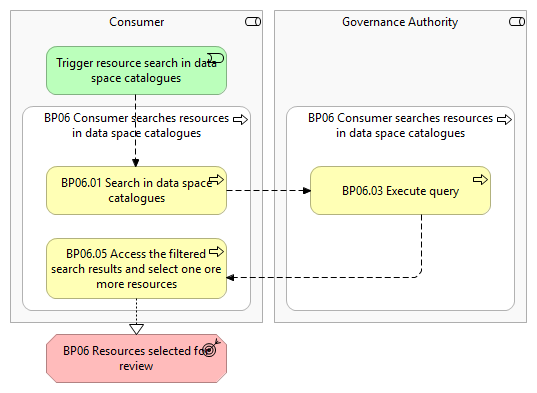BP06 – Consumer searches resources in data space catalogues
To help understand the content of this document, readers should familiarize themselves with the key definitions and actors.
Overview
This business process covers the situation where a data space Consumer can search resources in the catalogue of one or multiple data spaces. Within the process the Consumer can search for resource descriptions, which can refer to data, application, or infrastructure resources. There are three types of ‘search’ available: quick search, federated search, and advanced search.
- Quick search: Use one or multiple search terms that are matched against any field in the resource description.
- Federated search: Perform searches across multiple data spaces simultaneously.
- Advanced search: Specify values for one or more attributes of the resource description to refine the search results.
It includes the following main steps:
- Search in data space catalogues: The Consumer initiates a search in the data space catalogue using either a quick search, advanced search, or a federated search (searching multiple data space catalogues at once) within the same or another data space. To achieve this, the Consumer inputs the search terms relevant to their intended search.
- Execute query: The Governance Authority finds resource description matching the provided search terms within the data space's own catalogue or, in case of the federated search, within data space catalogues shared by other data spaces.
- Access the filtered search results and select one or more resources: The Governance Authority provides the filtered search results to the participant’s system, showing only the resource description they are permitted to access. The results of the search are available to the Consumer, who can access and display the details of selected resource descriptions.
Actors
The following actors are involved:
- Governance Authority
- Consumer
Assumptions
The following assumptions are made:
- There is a mechanism in place to perform a quality rating of the resources based on its predefined quality rules.
Prerequisites
The following prerequisites must be met to enable the process to occur:
- Dataspace is configured: The Governance Authority has configured the catalogue with the corresponding vocabulary and schemas to have the general structure of a resource description, contract clauses, and other vital components (Business Process 2).
- Consumer onboarded: Before the Consumer can consume any resources to a data space they should have successfully completed the onboarding business process (Business Process 3A).
- End-User authenticated & authorised: The End-User is authenticated and has the appropriate role and permissions to perform the steps in the process (Business Process 3B).
Details
The following shows the detailed business process diagram and gives the step descriptions.
Trigger resource search in data space catalogues
The Consumer initiates the search in data space catalogues.
BP06.01 Search in data space catalogues
The Consumer initiates a search in the data space catalogue using either a quick search, advanced search, or a federated search (searching multiple data space catalogues at once) within the same or another data space. To achieve this, the Consumer inputs the search terms relevant to their intended search.
BP06.02 Add access policy filter parameters to the query
The query is decorated with filters based on access policies that allow to perform a query only on those resource descriptions for which the access policies permit the Consumer (and potentially the specific End-User of the Consumer) to access and use the associated resource.
BP06.03 Execute query
The Governance Authority finds resource description matching the provided search terms within the data space's own catalogue or, in case of the federated search, within data space catalogues shared by other data spaces.
BP06.04 Conduct a quality rating of the resources
The Governance Authority conducts a quality rating of the resources based on its predefined quality rules. The filtered results include a quality rating of the resources which are displayed to the Consumer.
BP06.05 Access the filtered search results and select one or more resources
The Governance Authority provides the filtered search results to the participant’s system, showing only the resource description they are permitted to access. The results of the search are available to the Consumer, who can access and display the details of selected resource descriptions.
Outcome
- Resources selected for review: The Consumer accesses and can consult the usage contract template identifying the terms and conditions related to the use of selected resource it has discovered in the data space catalogues. The Consumer then decides whether or not to consume the resource that is offered by the Provider (Business Process 8, 9A & 9B). In case a contract is required for the consumption of a resource and not already in place, the Consumer and Provider establish a usage contract (Business Process 7).
| Business Process | Status: Proposed |
High Level Requirements
6.1 - Data quality assessment
Simpl shall verify the quality rules when searching the data catalogue ...
6.2 - Search in data/application/infrastructure catalogue in another federated data space
Simpl shall forward the search request ...6.3 - Search in data/application/infrastructure catalogue through a UI or an API
Simpl shall offer the possibility to the customer to provide search ...6.4 - Request a resource
Simpl shall offer the possibility of requesting to ...6.5 - Search Results
Simpl shall provide a Data Consumer the results of the ...6.6 - Limit search parameters to referred vocabularies for UI and API search
Simpl shall support, when a Consumer uses the advanced search ...

Please log in or sign up to comment.